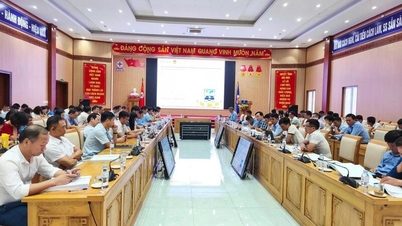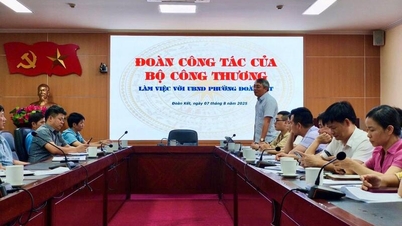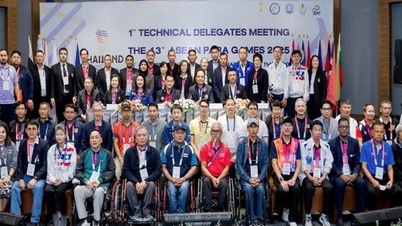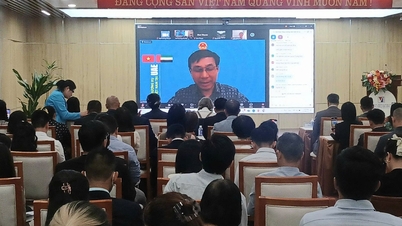The Standing Committee of the Inspection Agency believes that the draft Law on E-Commerce needs to clearly stipulate the control tools and responsibilities for controlling livestream sales content; review cases where e-commerce platform owners must take measures to prevent livestream sales in e-commerce.
Continuing the 49th Session, on the morning of September 22, Standing Committee of the National Assembly comment on the draft Law on E-commerce.
Presenting the report, Deputy Minister of Industry and Trade Nguyen Sinh Nhat Tan stated that in order to ensure the maintenance of a long-term and stable legal framework for legal documents, it is necessary to develop a Law on E-commerce instead of maintaining documents at the decree level because the law has a higher legal value than the decree, and is the basis for regulating important, principled and comprehensive issues in the field. e-commerce

The Draft Law on E-commerce consists of 8 chapters and 50 articles, regulating: contract conclusion in e-commerce; types and responsibilities of entities in e-commerce activities; responsibilities of organizations providing e-commerce support services; e-commerce development; application of technology in e-commerce management; dispute resolution, inspection and handling of violations in e-commerce...
Compared with current law, the draft law amends and supplements comprehensive legal positioning of e-commerce operation models, from direct sales and service provision to multi-party sales models, enhancing the responsibilities of e-commerce platform owners in reviewing, informing, supporting the recall of defective products and goods, protecting consumers, and storing transaction information for inspection and examination.
Expand the responsibilities of social networking platforms with e-commerce activities; add regulations for multi-service integrated platforms; add legal responsibilities of platform owners in preventing the risk of abuse of monopoly position and manipulation of algorithms causing damage, ensuring the promotion of healthy innovation in the digital ecosystem.
In addition, the draft also supplements the responsibilities of the subjects participating in the activities. Livestream sales, affiliate marketing in identification, information transparency, storage and protection of consumer rights.

Accordingly, for livestream sales activities, the platform owner must authenticate the identity of the livestreamer, publicize and implement mechanisms and measures to control livestream sales content in real time. The seller must provide the livestreamer with legal documents proving that they meet the conditions.
Livestreamers are not allowed to provide false or misleading information about the uses, origin, quality, price, promotions, warranty policies and other content related to goods and services. At the same time, they must correctly implement advertising content that has been confirmed by competent authorities for goods and services in cases where the law requires confirmation of advertising content.
Reviewing cases where e-commerce platform owners must take measures to prevent livestream sales
During the preliminary examination, Chairman of the Economic and Financial Committee Phan Van Mai proposed to clearly define the scope and content of "e-commerce activities" regulated by the Law on E-commerce, clarify the boundaries of e-commerce with other sectors and fields, distinguish it from related activities regulated by other laws, and attach specific and clear management goals.
The Standing Committee of the Appraisal Agency also proposed to study and adjust the provisions in Appendix 4 of the Investment Law on e-commerce activities, which are identified as conditional investment and business sectors and professions, to ensure consistency and avoid confusion in the understanding of e-commerce activities in a broad sense.
Regarding livestream sales and affiliate marketing activities and the responsibilities of entities participating in livestream sales and affiliate marketing activities in e-commerce, the Standing Committee of the Review Committee believes that the nature of these activities is another form of advertising and brokerage in the electronic environment.
To ensure that legal regulations are clear, the scope of rights, obligations and responsibilities of each relevant entity is clear and complete, it is recommended that the drafting agency review and continue to perfect the regulations in the direction of clarifying the specific contents stipulated in the Law on E-commerce that are not yet stipulated in the Law on Advertising.

The Standing Committee of the Inspection Agency also believes that it is necessary to clearly define the control tools and responsibilities for controlling livestream content, clearly define the scope of obligations between platform owners and state management agencies; clearly define joint responsibilities when disputes, complaints, and denunciations arise about the quality of goods and services advertised and marketed in association.
Research and supplement specific regulations on the responsibilities of entities for the objects of buying, selling, and affiliate marketing as services; the responsibility to warn consumers when advertised goods and services have risky elements or when there is official information published by state management agencies about risks or issues related to the circulation and use of advertised goods and services.
Regarding livestream sales activities in e-commerce, the Standing Committee of the inspection agency proposed to study and perfect regulations in the direction of limiting the scope of livestream sales activities in e-commerce as prescribed in the draft Law to only apply to e-commerce platforms with the function of opening booths and placing orders online.
At the same time, it is recommended to review and define the rights, obligations and responsibilities of the owners of e-commerce platforms with livestream sales activities, sellers in livestream sales activities, and livestream sellers, ensuring clarity, feasibility, suitability and comprehensiveness.
Accordingly, it is proposed to review cases where e-commerce platform owners must take measures to prevent livestream sales in Article 21, clarify that e-commerce platform owners have the authority to agree/disagree to allow livestream activities if they have not received a document confirming the advertising content, and clearly stipulate sanctions when platform owners do not take measures to prevent livestream sales of goods and services prohibited from advertising.
In the case of livestream sales on e-commerce platforms and social networks that do not have the function of opening a booth or placing an order online, the contract is made through direct exchange between the seller and the buyer. It is recommended to supplement the explanation and clarify the provisions of current laws and management tools for this case.
Regarding affiliate marketing activities in e-commerce, the Standing Committee of the Review Committee believes that affiliate marketing activities are a form of advertising and brokerage. In the case of affiliate marketing in the electronic environment, the conclusion of contracts for the purchase and sale of goods and services being marketed and advertised can take place in both the traditional and electronic environments; therefore, it is recommended to explain and clarify current regulations and management tools for this content; clarify whether this content is within the scope of this draft Law or not because the scope of the concept of "e-commerce activities" in the draft is very broad.
It is expected that the draft Law on E-commerce will be submitted to the National Assembly for consideration and approval at the 10th Session (October-November 2025).
Source: https://baolangson.vn/quy-dinh-ro-cong-cu-kiem-soat-va-trach-nhiem-kiem-soat-noi-dung-livestream-ban-hang-5059681.html


![[Photo] Editor-in-Chief of Nhan Dan Newspaper Le Quoc Minh received the working delegation of Pasaxon Newspaper](https://vphoto.vietnam.vn/thumb/1200x675/vietnam/resource/IMAGE/2025/9/23/da79369d8d2849318c3fe8e792f4ce16)

























![[Photo] Prime Minister Pham Minh Chinh chairs the 14th meeting of the Steering Committee on IUU](https://vphoto.vietnam.vn/thumb/1200x675/vietnam/resource/IMAGE/2025/9/23/a5244e94b6dd49b3b52bbb92201c6986)





































![[Photo] Solemn opening of the 1st Congress of Party Delegates of Central Party Agencies](https://vphoto.vietnam.vn/thumb/402x226/vietnam/resource/IMAGE/2025/9/24/82a89e250d4d43cbb6fcb312f21c5dd4)






























Comment (0)